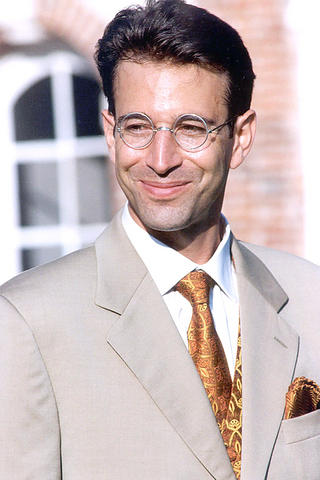After Wall Street reporter Daniel Pearl was kidnapped and executed by Islamic extremists in Pakistan six years ago, his parents, Ruth and Judea Pearl, chose to use thier family's tragedy to help promote cultural understanding. As a result, the Daniel Pearl Music Day event was begun in 2002 and has been held worldwide every year since.
Hosted by the Taiwan Foreign Correspondents Club, the sixth annual Taiwan Daniel Pearl Music Day (TDPMD) is set to take place on Sunday with sponsored beer, food and drinks. It will be a day of music to spread the message of unity across cultural divides.
"Music is one of the few things people can share. It doesn't matter who we are or what our cultural and ethnic backgrounds are, we can all appreciate and be moved by music equally," said event organizer Sean Scanlan, whose sister helped Daniel Pearl's parents organize the first music event in Los Angeles.

The TDPMD event features nine local bands including event regulars Public Radio and David Chen and the Muddy Basin Ramblers. Taiwanese rock band Black Summer Days and music festival favorite Coach will join the music marathon along with the 10-piece Al's Hothouse Chicago Jazz Band and the country trio Two Acres Plowed.
This year, the event will move from Treasure Hill (寶藏巖聚落) to Xinyi Public Assembly Hall (公民會館), a new art space at 44 South Village (四四南村), a military dependents' village in Xinyi District. Performances will take place on the main plaza where participants can enjoy the late-summer breeze in the preserved historical housing compound.
Visitors are encouraged to make donations of NT$200. The money will be used to pay the bands. "Though it's really not much, we want to show respect for the musicians and not take advantage of them," said Scanlan, adding that profits will be donated to the Daniel Pearl Foundation (www.danielpearl.org), which has taken an active role in raising public awareness of conflict.

PHOTOS: COURTESY OF THE DANIEL PEARL FOUNDATION
The Xinyi Public Assembly Hall is located at 50 Songqin St, Taipei (台北市松勤街50號). The event will start at 1pm and end at 10pm. For more information, contact seanscanlan@gmail.com.

Google unveiled an artificial intelligence tool Wednesday that its scientists said would help unravel the mysteries of the human genome — and could one day lead to new treatments for diseases. The deep learning model AlphaGenome was hailed by outside researchers as a “breakthrough” that would let scientists study and even simulate the roots of difficult-to-treat genetic diseases. While the first complete map of the human genome in 2003 “gave us the book of life, reading it remained a challenge,” Pushmeet Kohli, vice president of research at Google DeepMind, told journalists. “We have the text,” he said, which is a sequence of

On a harsh winter afternoon last month, 2,000 protesters marched and chanted slogans such as “CCP out” and “Korea for Koreans” in Seoul’s popular Gangnam District. Participants — mostly students — wore caps printed with the Chinese characters for “exterminate communism” (滅共) and held banners reading “Heaven will destroy the Chinese Communist Party” (天滅中共). During the march, Park Jun-young, the leader of the protest organizer “Free University,” a conservative youth movement, who was on a hunger strike, collapsed after delivering a speech in sub-zero temperatures and was later hospitalized. Several protesters shaved their heads at the end of the demonstration. A

Every now and then, even hardcore hikers like to sleep in, leave the heavy gear at home and just enjoy a relaxed half-day stroll in the mountains: no cold, no steep uphills, no pressure to walk a certain distance in a day. In the winter, the mild climate and lower elevations of the forests in Taiwan’s far south offer a number of easy escapes like this. A prime example is the river above Mudan Reservoir (牡丹水庫): with shallow water, gentle current, abundant wildlife and a complete lack of tourists, this walk is accessible to nearly everyone but still feels quite remote.

In August of 1949 American journalist Darrell Berrigan toured occupied Formosa and on Aug. 13 published “Should We Grab Formosa?” in the Saturday Evening Post. Berrigan, cataloguing the numerous horrors of corruption and looting the occupying Republic of China (ROC) was inflicting on the locals, advocated outright annexation of Taiwan by the US. He contended the islanders would welcome that. Berrigan also observed that the islanders were planning another revolt, and wrote of their “island nationalism.” The US position on Taiwan was well known there, and islanders, he said, had told him of US official statements that Taiwan had not